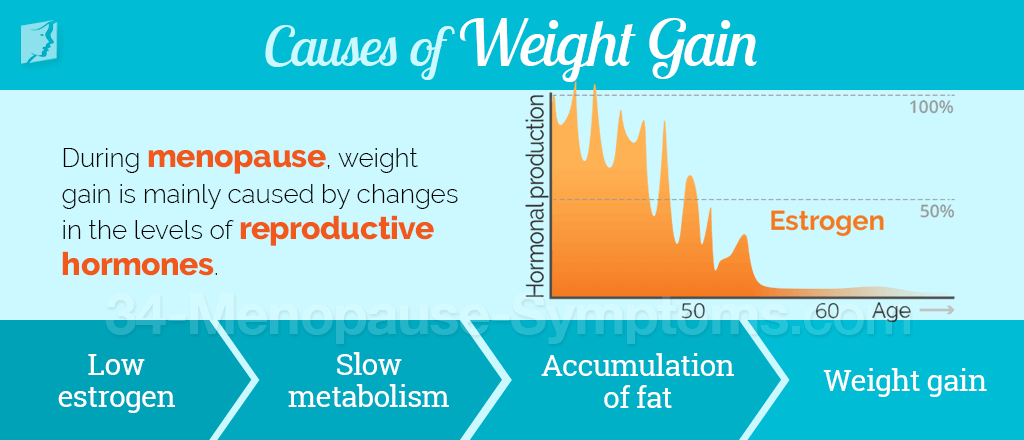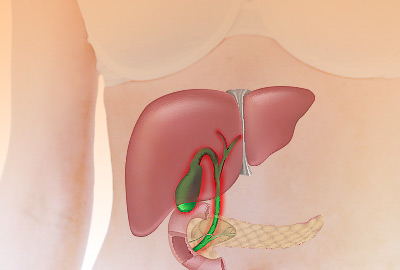Weight gain is a normal aspect of getting older. Metabolism naturally slows down with age. Although age in itself can lead to weight gain, women approaching menopause are at a greater risk of weight gain due to fluctuating hormone levels.
Hormones play a major role in weight regulation. As their levels become imbalanced and ultimately diminished, the likelihood of weight gain increases. Continue reading to learn more about the hormonal effects and other causes of weight gain during menopause.
Hormonal Causes of Weight Gain
Hormones have a direct effect on every contributing factor to weight gain: appetite, metabolism, and fat storage. Because of these factors, menopausal women are more likely to gain weight. Women typically begin picking up about one pound a year during perimenopause, the roughly ten-year period leading up to menopause that generally takes place between age 45 and 55.
Hormones and weight gain
A woman's hormones have complex functions in her body, including weight control. Here's a list of the different hormones that can affect weight gain and how:
Did You Know?
Most women experience a 5% decrease in metabolic rate per decade.
Because metabolism slows as women approach menopause, they need about 200 fewer calories a day to maintain their weight as they enter their mid to late 40s.
Estrogen
As a woman's ovaries produce less estrogen, the body attempts to derive it from other places. Fat cells can produce estrogen, so the body works harder to convert calories into fat to increase estrogen levels. Because fat cells do not burn calories the way muscle cells do, weight gain typically results.
Progesterone
Water retention is often linked to menopause because water weight and bloating are caused by decreased progesterone levels. Though this does not actually result in weight gain, clothes can feel a bit tighter and a woman may feel as though she's heavier.

Testosterone
The amount of this hormone generally increases at the onset of menopause relative to estrogen levels. It's responsible for redistributing weight to the midsection instead of to the hips.
Hypothyroidism and weight gain
Women with an underactive thyroid often experience weight gain because their metabolic rate slows down as a result of the condition. Thyroid hormones essentially regulate calorie consumption in the body. With an underactive thyroid, fewer calories are burned and converted into energy. Instead, they are stored in the body. Here are some reasons why women experience hypothyroidism and low metabolic rate more than men:
Women tend to be more affected by stress than men, which impacts their adrenal, brain, and thyroid function.
Because women experience monthly hormonal fluctuations from their menstrual cycles, their biochemistry is greatly affected.
Hormones and Appetite
A drop in hormone levels, particularly estrogen and progesterone, can increase a woman's appetite and influence her to eat up to 67% more, according to one study. An increase in appetite coupled with a slower metabolism with the onset of menopause can cause weight gain in women. This could, perhaps, account for the 12% jump in the number of women who are overweight in midlife compared to women in their 20s and 30s.
Other Causes of Weight Gain
Although hormones are largely responsible for weight gain during menopause, there are other factors that can play a role as well. They are separated into two categories: age and lifestyle factors.
Age and Weight Gain
Did You Know?
There is on average a 40 - 50% reduction in an individual's muscle mass between ages 30 and 70, with a simultaneous increase in body fat. This transition sets the groundwork for slower metabolism, reduced physical activities, and difficulty burning calories, thus leading to weight gain.
Beginning at about age 30, an individual's physical abilities begin to decrease and continue deteriorating until about age 60 or 70 due to a gradual decline in muscle mass. The body's abilities then level off and decline at a slower rate. The rate of decline depends largely on an individual's physical activity and particular lifestyle. This decreasing physical ability affects weight because a person becomes less able to engage in physical activities that burn calories and help maintain weight. To compound the potential for weight gain with age, metabolic rate begins to slow after age 30, which also leads to weight gain.
Lifestyle and Weight Gain
Not only is a person's physiology working against her as she ages, but lifestyle factors can make her susceptible to weight gain. For instance, her job in later life may require less physical activity, she may eat out at restaurants more frequently, or she may be too busy with work to exercise regularly.
Depression and Weight Gain
While the precise relationship is unclear, depression and weight gain are connected. Many people who suffer from depression eat more and exercise less. Antidepressant medication can also lead to weight gain.
Even though physical changes are an unavoidable aspect of getting older, a woman's lifestyle plays a significant role over whether or not she will gain weight during menopause. Below are some lifestyle factors that can lead to weight gain:
- Stress
- Reduced physical activity
- Changes in eating habits
- Medication use
- Drinking excess amounts of alcohol
With the causes of weight gain during menopause explained, it's now time to read about the treatments for weight gain to learn how to take back control of weight and health.
Sources
- Davis, S.R. et al. (2012). Understanding weight gain at menopause. Climacteric, 15(5), 419-429. doi: 10.3109/13697137.2012.707385.
- Janssen, I. et al. (2010). Testosterone and Visceral Fat in Midlife Women: The Study of Women's Health Across the Nation (SWAN) Fat Patterning Study. Obesity (Silver Spring), 18(3), 604-610. doi: 10.1038/oby.2009.251
- National Cancer Institute. (2012). Obesity and Cancer Risk. Retrieved April 29, 2016, from http://www.cancer.gov/about-cancer/causes-prevention/risk/obesity/obesity-fact-sheet#q4
- National Institutes of Health. (2013). Weight gain - unintentional. Retrieved April 29, 2016, from https://www.nlm.nih.gov/medlineplus/ency/article/003084.htm


